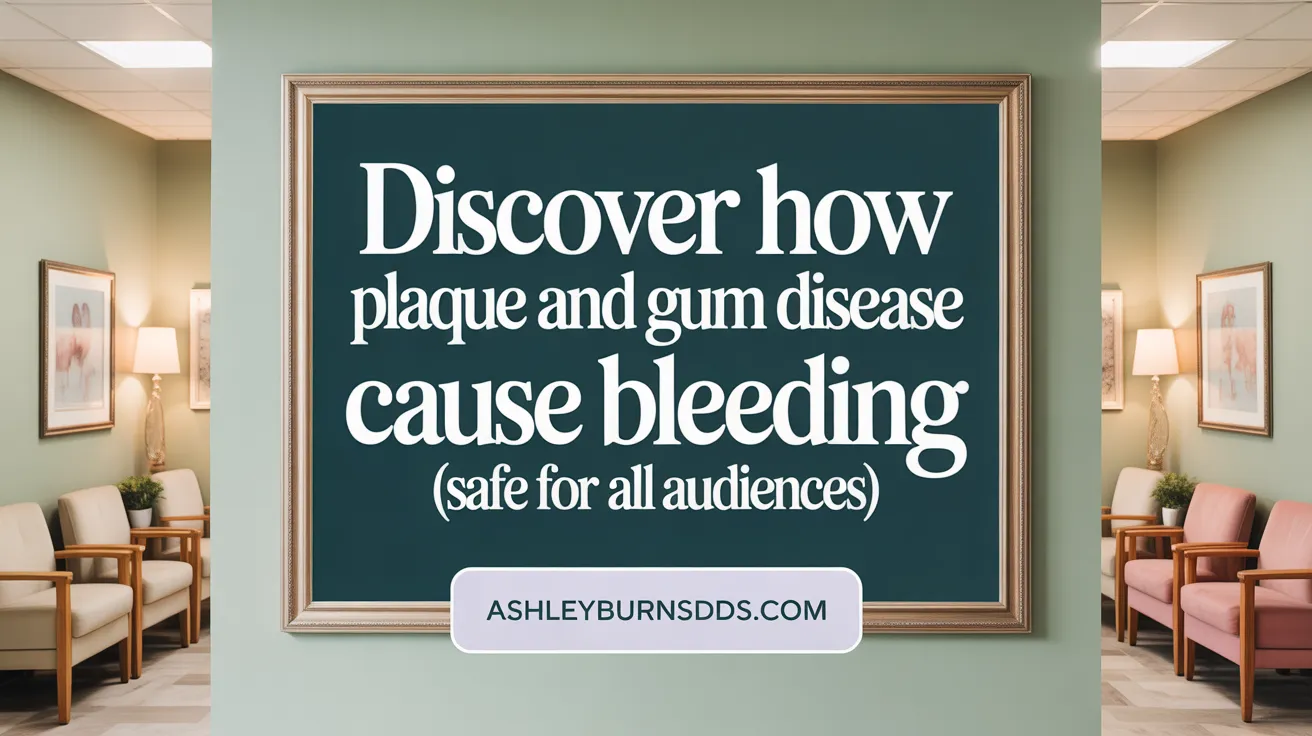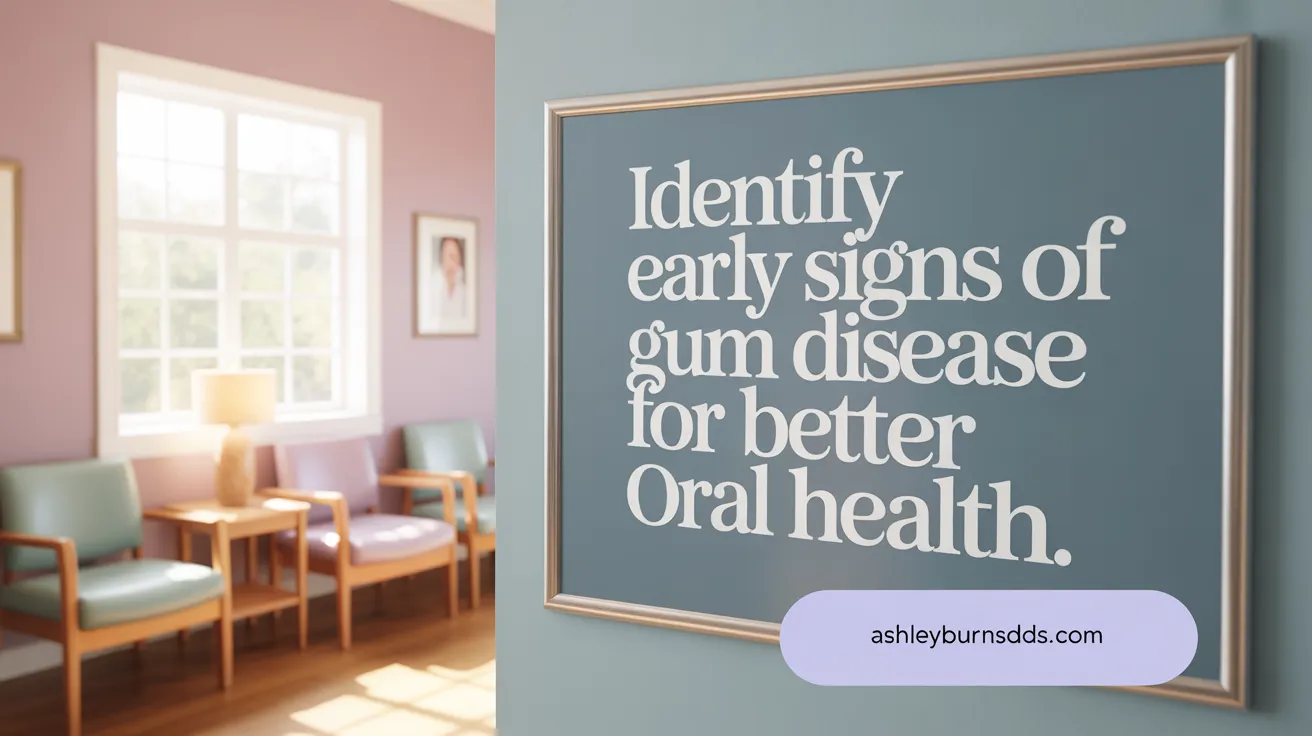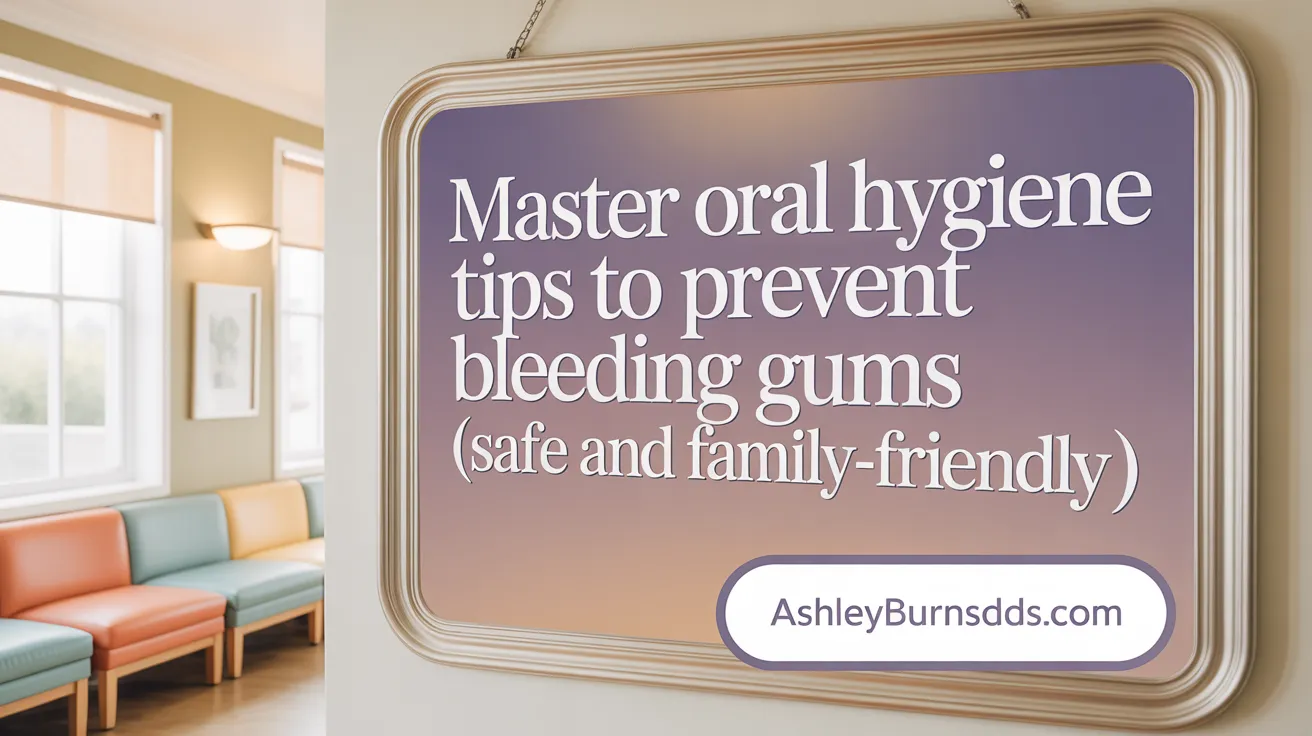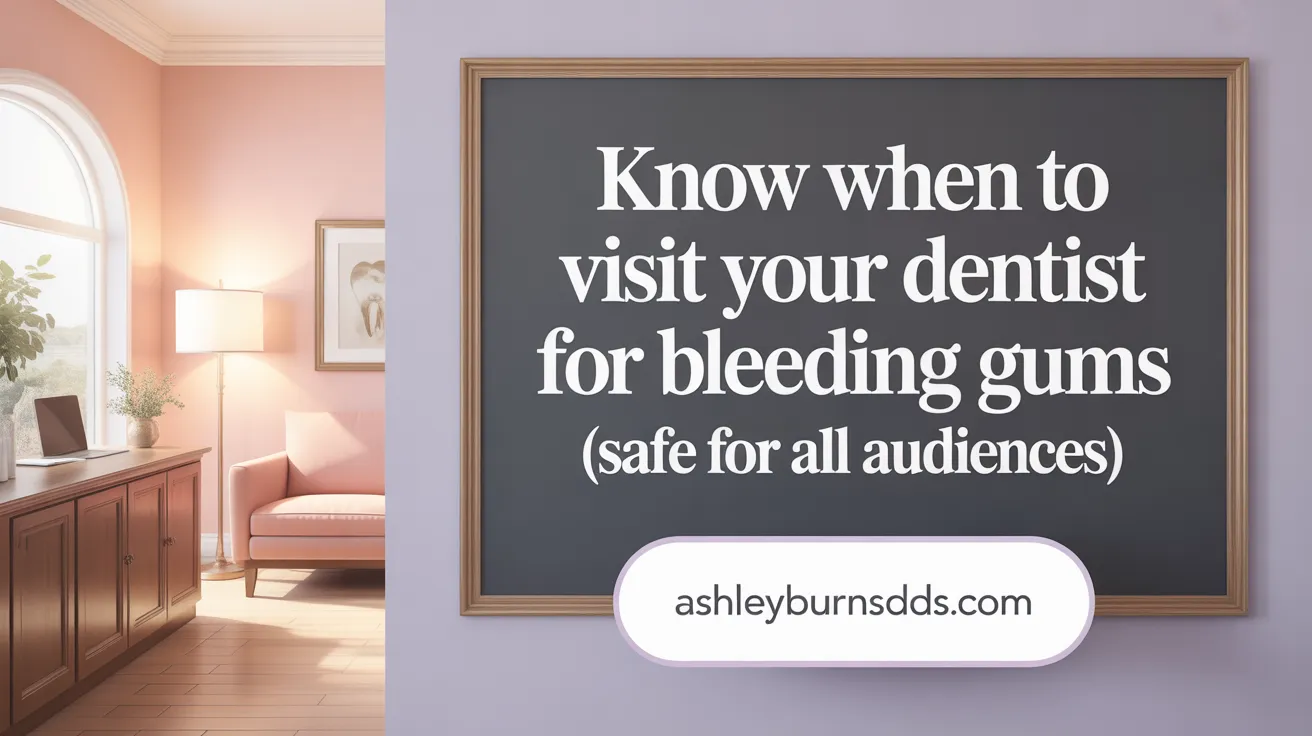Why Do Gums Bleed When You Brush?
Bleeding gums during brushing is a common concern that can signal underlying oral health issues. While occasional bleeding might not seem alarming, persistent or severe bleeding often points to gum disease or other health problems that require attention. This article explores the main reasons why gums bleed when brushing, associated symptoms, health implications, and preventive strategies to maintain healthy gums and teeth.
The Role of Plaque and Gum Disease in Bleeding Gums

What are the common causes of gums bleeding during brushing?
The most frequent cause of bleeding gums during brushing is the buildup of plaque along the gum line. Plaque is a sticky film of bacteria that continuously forms on your teeth and gums. When plaque is not removed properly through daily brushing and flossing, it can harden into tartar, also known as calculus. Tartar irritates the delicate gum tissues, leading to inflammation and bleeding.
Plaque harbors bacteria that produce acids, damaging the gum tissue and causing it to become swollen, tender, and more prone to bleeding during routine oral hygiene practices.
What role do plaque buildup and gum disease play in causing bleeding gums?
Plaque accumulation is at the core of gum problems like gingivitis and periodontitis, both of which can cause bleeding gums. If plaque isn’t effectively cleaned away, bacteria within it multiply and release toxins that irritate and inflame the gums.
Gingivitis is an early and reversible form of gum disease characterized by redness, swelling, tenderness, and bleeding of the gums, especially during brushing or flossing. If neglected, gingivitis can develop into periodontitis, a more severe condition where the infection damages the supporting structures of the teeth, including bone and tissue.
In periodontitis, the ongoing bacterial invasion leads to the destruction of gum tissue and the formation of deep pockets around the teeth. This process causes gums to recede, bones to deteriorate, and teeth to become loose.
Maintaining proper oral hygiene by regular brushing, flossing, and professional cleanings helps control plaque buildup, reducing the risk of gum inflammation and bleeding. Reducing plaque not only helps prevent bleeding gums but also protects against more serious conditions like gum recession and tooth loss.
| Cause | Effect | Additional Detail |
|---|---|---|
| Plaque buildup | Leads to gingivitis | Causes inflammation, redness, bleeding |
| Tartar formation | Irritates gums | Hard plaque that cannot be removed by brushing |
| Bacterial infection | Damages gum tissue | Produces toxins, triggers immune response |
| Gum inflammation | Causes bleeding | Shows early signs of gum disease |
| Periodontitis | Leads to tissue and bone loss | Advanced gum disease, severe oral health issues |
Effective oral hygiene practices are essential in preventing the cycle of plaque accumulation, gum inflammation, and bleeding. Regular dental checkups can help remove hardened tartar and address any early signs of gum disease, ensuring healthier gums and a better overall oral health.
Medical and Lifestyle Factors That Lead to Gum Bleeding

What medical conditions can lead to gum bleeding?
Many medical conditions can cause gums to bleed more easily. Gum diseases like gingivitis and periodontitis result from plaque buildup and bacterial infection, leading to inflammation, redness, and bleeding during brushing or flossing.
Systemic health issues also play a role. Conditions such as diabetes, leukemia, and other blood disorders—including hemophilia and thrombocytopenia—interfere with the blood’s ability to clot normally, which can cause persistent bleeding in the gums. Vitamin deficiencies, especially of vitamin C (which causes scurvy) and vitamin K, weaken gum tissues and impair clotting functions, making bleeding more likely.
Hormonal fluctuations—such as those during pregnancy or menopause—autoimmune diseases, and immune-compromising conditions like HIV/AIDS can make gums more sensitive and prone to bleeding. Certain medications, particularly blood thinners and anti-inflammatory drugs (NSAIDs), further increase the risk. Poor oral hygiene and habits like smoking and stress can worsen these underlying issues, highlighting the importance of medical consultation if bleeding persists.
How do vitamin deficiencies and other health factors impact gum health and cause bleeding?
Vitamin deficiencies directly affect the strength and healing capacity of gum tissues. A lack of vitamin C impairs collagen synthesis — essential for maintaining healthy gums — which results in swollen, tender, and bleeding gums. This deficiency also delays tissue repair and makes gums more vulnerable to infection.
Similarly, vitamin K is vital for blood clotting. A deficiency can cause increased bleeding, including in the gums. Inadequate levels of other nutrients like vitamin D, B vitamins, iron, and calcium can contribute to weakened gum tissues and slowed healing of oral wounds.
Other health factors that influence gum bleeding include hormonal changes experienced during pregnancy, which can increase blood flow to gums, making them swollen and more likely to bleed. Chronic diseases such as diabetes and leukemia compromise the immune response and healing process, exacerbating gum problems. Certain medications, especially blood thinners, impair clotting ability, and immune system conditions can elevate bleeding risk. Maintaining proper nutritional intake and managing systemic health are crucial for gum health and preventing bleeding.
Recognizing Symptoms and Health Implications of Bleeding Gums
 Bleeding gums often signal underlying gum problems like gingivitis, especially in its early stages. Common symptoms include gums that are red, swollen, tender, and prone to bleeding during brushing or flossing. Bad breath may also accompany these symptoms, indicating inflammation or infection.
Bleeding gums often signal underlying gum problems like gingivitis, especially in its early stages. Common symptoms include gums that are red, swollen, tender, and prone to bleeding during brushing or flossing. Bad breath may also accompany these symptoms, indicating inflammation or infection.
In addition to these signs, gum recession or loosening of teeth can occur if the condition worsens. Persistent bleeding without proper care can lead to more severe issues such as tissue damage or bone loss. Recognizing these early indicators is essential to prevent irreversible damage.
Beyond the mouth, bleeding gums can point to systemic health problems. Deficiencies in vitamins C and K impair tissue repair and blood clotting, making gums more susceptible to bleeding. Conditions like diabetes, leukemia, blood clotting disorders, and hormonal fluctuations—such as during pregnancy—also increase risk.
The health implications extend further: untreated gum disease can contribute to tooth loss and is linked with more serious health issues, including heart disease, diabetes complications, and respiratory conditions.
Seeking timely diagnosis from a dental or healthcare professional is crucial if bleeding persists beyond two weeks or occurs frequently. Proper treatment may involve improving oral hygiene, addressing vitamin deficiencies, managing systemic health issues, or adjusting medications like blood thinners.
Understanding these symptoms and risks emphasizes the importance of regular dental check-ups and maintaining good oral health habits. Early intervention can prevent the progression of gum disease and protect overall health.
Effective Oral Hygiene Practices to Prevent and Manage Bleeding Gums

How can proper oral hygiene techniques prevent bleeding gums?
Proper oral hygiene practices are fundamental in preventing bleeding gums by controling plaque buildup, which is the main cause of gum irritation and inflammation. Gentle brushing twice daily with a soft-bristled toothbrush and using circular motions at a 45-degree angle toward the gum line help avoid damaging delicate gum tissues. Flossing daily is equally important, as it removes trapped food particles and plaque between teeth without causing trauma. Incorporating an antibacterial mouthwash reduces bacterial load, further protecting gums from infection. Additionally, maintaining a nutrient-rich diet—particularly high in vitamins C and K—supports tissue repair and blood clotting, making gums stronger and less prone to bleeding. Regular dental visits ensure professional removal of tartar and early detection of gum problems, which home care alone might not address.
What preventive measures can help avoid gum bleeding?
Preventing gum bleeding hinges on consistent and proper oral hygiene routines. Using a soft-bristled toothbrush and gentle brushing techniques avoids gum recession and trauma. Flossing daily helps eliminate plaque and food debris from between teeth carefully to prevent irritation. A balanced diet rich in essential vitamins, especially vitamins C and K, plays a significant role in maintaining healthy, resilient gums and proper blood clotting mechanisms. Avoiding tobacco helps reduce bacterial growth and inflammation, further decreasing bleeding risks. Simple measures like rinsing with saline solution or using antiseptic mouthwash can help control minor bleeding episodes. Regular dental check-ups are vital, as they facilitate early intervention before problems escalate to more severe conditions such as periodontitis.
How can bleeding gums be stopped immediately at home?
If gums start bleeding, quick first aid can be performed at home. Rinse your mouth gently with warm salt water—dissolving a teaspoon of salt in half a cup of warm water—to help soothe inflamed tissues and reduce bacterial activity. Applying gentle pressure with a clean cloth or gauze to the bleeding area can help control the blood flow. A cold compress or ice pack applied externally over the cheek on the affected side aids in constricting blood vessels, reducing bleeding and swelling. Maintaining good oral hygiene by brushing with a soft-bristled toothbrush and flossing daily prevents ongoing irritation. If bleeding persists beyond two weeks, worsens, or is accompanied by swelling, pain, or other symptoms, seek medical advice from a healthcare professional for proper assessment and treatment.
When to Seek Professional Help and Overcoming Common Myths

When should one seek professional dental care for bleeding gums?
Persistent bleeding gums are not something to ignore. You should see a dentist if your gums bleed continuously for more than two weeks, despite maintaining good oral hygiene. Heavy bleeding that does not stop with pressure, or bleeding accompanied by pain, swelling, or gum recession, warrants immediate dental consultation.
Signs such as developing bad breath, loose teeth, or visible gum recession also indicate the need for professional evaluation. Children with bleeding gums or cases where systemic issues like vitamin deficiencies, blood disorders, or systemic illnesses are involved need prompt attention. Ignoring ongoing bleeding can lead to more severe gum disease, tissue damage, or even systemic health problems.
Early intervention helps prevent the progression of gum disease and addresses underlying issues promptly, ensuring better oral and overall health.
Maintaining Gum Health to Prevent Bleeding
Bleeding gums during brushing are often the first sign of gum issues that require attention. Understanding the causes, from plaque buildup and gum disease to systemic health factors and lifestyle habits, is crucial for effective prevention and treatment. Proper oral hygiene techniques, a balanced diet rich in essential vitamins, and avoiding harmful habits like smoking can significantly reduce the risk of bleeding gums. Importantly, persistent or severe bleeding should never be ignored—seeking professional dental care early can help prevent serious complications and protect your overall health. By adopting these strategies and recognizing warning signs, individuals can maintain healthy gums and confident smiles for years to come.
References
- Bleeding Gums: Causes & Treatment - Cleveland Clinic
- 7 Causes of Bleeding Gums - Golden State Dentistry
- Four Reasons Why Your Teeth Are Bleeding After Brushing
- Bleeding Gums and Your Health - WebMD
- Bleeding gums: MedlinePlus Medical Encyclopedia
- Bleeding Gums After Brushing: Causes and Prevention
- My Gums Bleed When I Brush: Should I be Concerned?
- How To Treat & Prevent Bleeding Gums - Corsodyl
- Bleeding gums and dental bleeding - Healthdirect
- 10 Causes of Bleeding Gums | Delta Dental Of Washington
